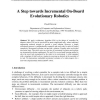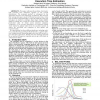10 search results - page 1 / 2 » Single step evolution of robot controllers for sequential ta... |
GECCO
2009
Springer
13 years 2 months ago
2009
Springer
The generation of robot controllers for a task requiring a sequence of elementary behaviors is still a challenge. If these behaviors are known, intermediate steps can be given to ...
SCAI
2001
13 years 5 months ago
2001
We apply evolutionary algorithm (EA) to the design of controller for adaptive robots. EAs can be successful for more complicated tasks, where traditional engineering methods strugg...
CORR
2004
Springer
13 years 4 months ago
2004
Springer
An approach to robotics called layered evolution and merging features from the subsumption architecture into evolutionary robotics is presented, and its advantages are discussed. T...
DATE
2010
IEEE
13 years 9 months ago
2010
IEEE
This paper addresses the problem of stochastic task execution time estimation agnostic to the process distributions. The proposed method is orthogonal to the application structure ...
SMC
2007
IEEE
13 years 10 months ago
2007
IEEE
—This paper discusses a new implementation of embodied evolution that uses the concept of punctuated anytime learning to increase the complexity of tasks that the learning system...



